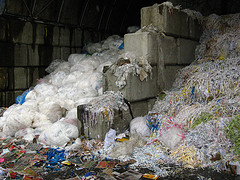 In preparation for when the oil runs out (or becomes economically unviable to extract – as detailed in The End of Oil by Paul Roberts) scientists have started developing alternative methods for making plastic. In this case from trees:
In preparation for when the oil runs out (or becomes economically unviable to extract – as detailed in The End of Oil by Paul Roberts) scientists have started developing alternative methods for making plastic. In this case from trees:
Some researchers hope to turn plants into a renewable, nonpolluting replacement for crude oil. To achieve this, scientists have to learn how to convert plant biomass into a building block for plastics and fuels cheaply and efficiently. In new research, chemists have successfully converted cellulose — the most common plant carbohydrate — directly into the building block called HMF in one step.
…
HMF, also known as 5-hydroxymethylfurfural, can be used as a building block for plastics and “biofuels” such as gasoline and diesel, essentially the same fuels processed from crude oil.
Given that so much of our industrial infrastructure rests on oil it is reassurring that alternative sources of basic materials are being developed.
[from Physorg][image from linh.ngân on flickr]
 The increasing prevalence of recycled plastics in the manufacturing industry – doubtless due in part to the currently-struggling Chinese trash-trawling industry – means that a lot of everyday objects are now made from what you might call “mongrel plastics”, a blend of different chemicals with similar physical properties. Which is good news… unless you’re a detective who needs to lift fingerprints from the stuff, that is.
The increasing prevalence of recycled plastics in the manufacturing industry – doubtless due in part to the currently-struggling Chinese trash-trawling industry – means that a lot of everyday objects are now made from what you might call “mongrel plastics”, a blend of different chemicals with similar physical properties. Which is good news… unless you’re a detective who needs to lift fingerprints from the stuff, that is.
The recycled products may look similar, but the physical and chemical properties differ so widely from the plastics they replace that the techniques honed over recent decades to lift fingerprints off plastics are no longer effective, he says.
Traditionally plastics were made from just one or two chemical building blocks, arranged in a predictable structure. But even plastics with just a trace of recycled feedstock become much more complex. Although consumers are encouraged to separate their plastics for recycling, the resulting plastics are inevitably more of a mongrel product than the pedigree plastics they replace.
Now there’s a nice little rogue state niche industry waiting to be exploited – custom mongrel plastics that defy forensics efforts. The cost of hiring an out-of-work plastics geek would be offset by the higher prices you could charge to your secretive customers. [image by meaduva]
Presenting the fact and fiction of tomorrow since 2001
 In preparation for when the oil runs out (or becomes economically unviable to extract – as detailed in The End of Oil by Paul Roberts) scientists have started developing alternative methods for making plastic. In this case from trees:
In preparation for when the oil runs out (or becomes economically unviable to extract – as detailed in The End of Oil by Paul Roberts) scientists have started developing alternative methods for making plastic. In this case from trees: The increasing prevalence of recycled plastics in the manufacturing industry – doubtless due in part to the
The increasing prevalence of recycled plastics in the manufacturing industry – doubtless due in part to the 